With no direct state financing, no public fundraising campaigns and no right to conduct business activities, Ukrainian parties continue accumulating tens of millions UAH on their accounts, which are transferred to their campaign funds later. In general, over 90% of all official party campaign expenses were spent on promotion in media. At the same time, as long as election funds are filled non-transparently, campaign expenses are excessive and uncontrolled. Civil Network OPORA calls to strengthen the oversight of campaign financing by an independent and specialized state body, and to oblige the parties publish full financial reports before and after the election campaign.
REPORT. Campaign financing during the 2014 parliamentary elections: campaign funds of political parties
In spite of the established campaign expense limits, the total expenditure for parliamentary elections was constantly increasing: 2002 – UAH 32.2 mln, 2006 – UAH 552.1 mln (17 times more), 2007 – UAH 579.2 mln (+5% of the previous campaign), 2012 – UAH 601.3 mln (+4%), 2014 – UAH 674.5 mln (+12%). The following parties had the largest campaign funds for early parliamentary elections: Batkivshchyna party (UAH 109.5 mln), Opposition Block (UAH 106.4 mln), Petro Poroshenko Block (UAH 97.4 mln), and People's Front (UAH 93.6 mln). According to Olha Aivazovska, Electoral and Parliamentary Programs Coordinator at the Civil Network OPORA, parties do not reveal sources of such "own funds" and, apparently, this shows their dependence on financing provided by big business. Besides that, there is not information about income, expenses, and property status in yearly financial reports of parties.
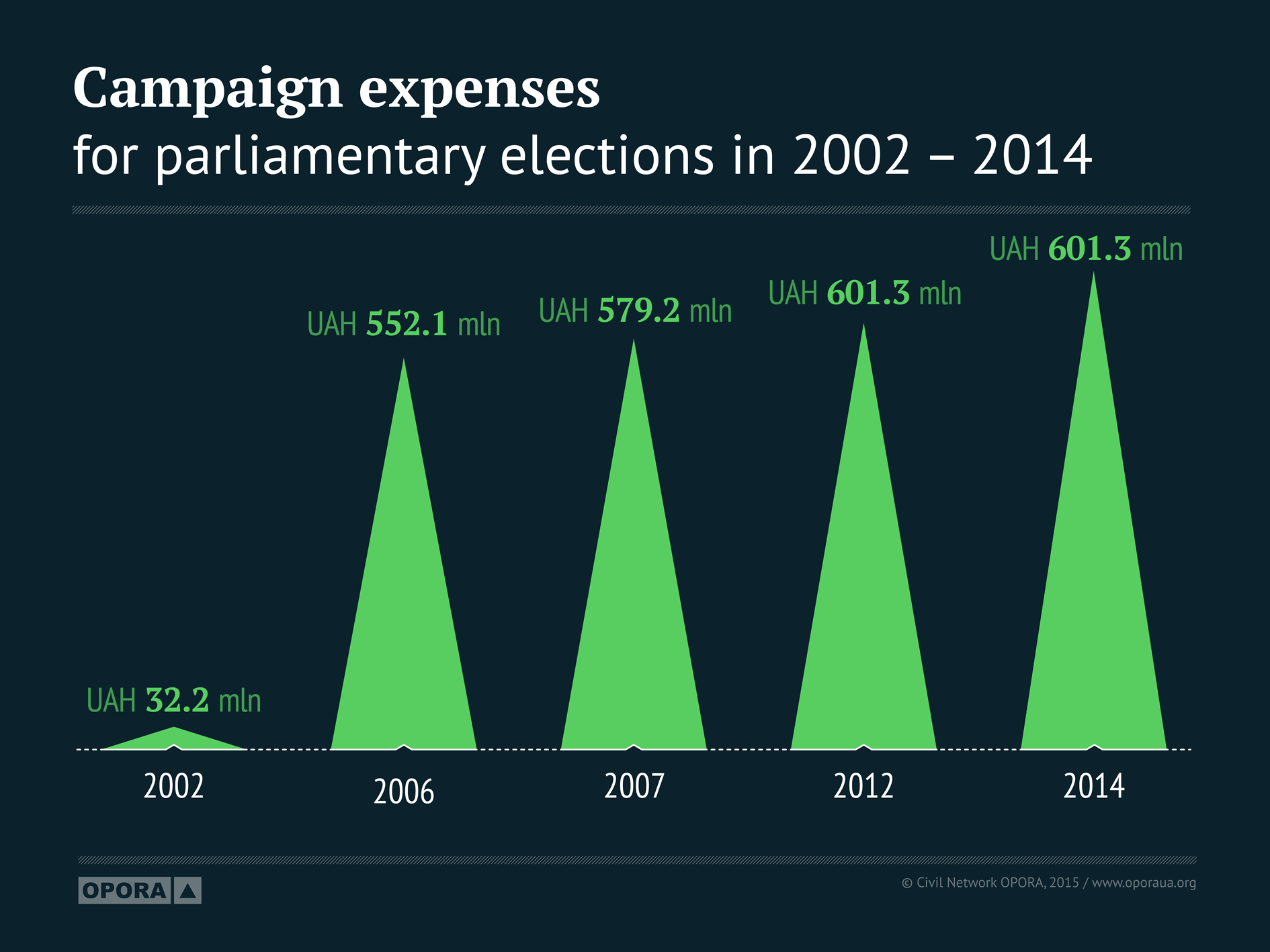
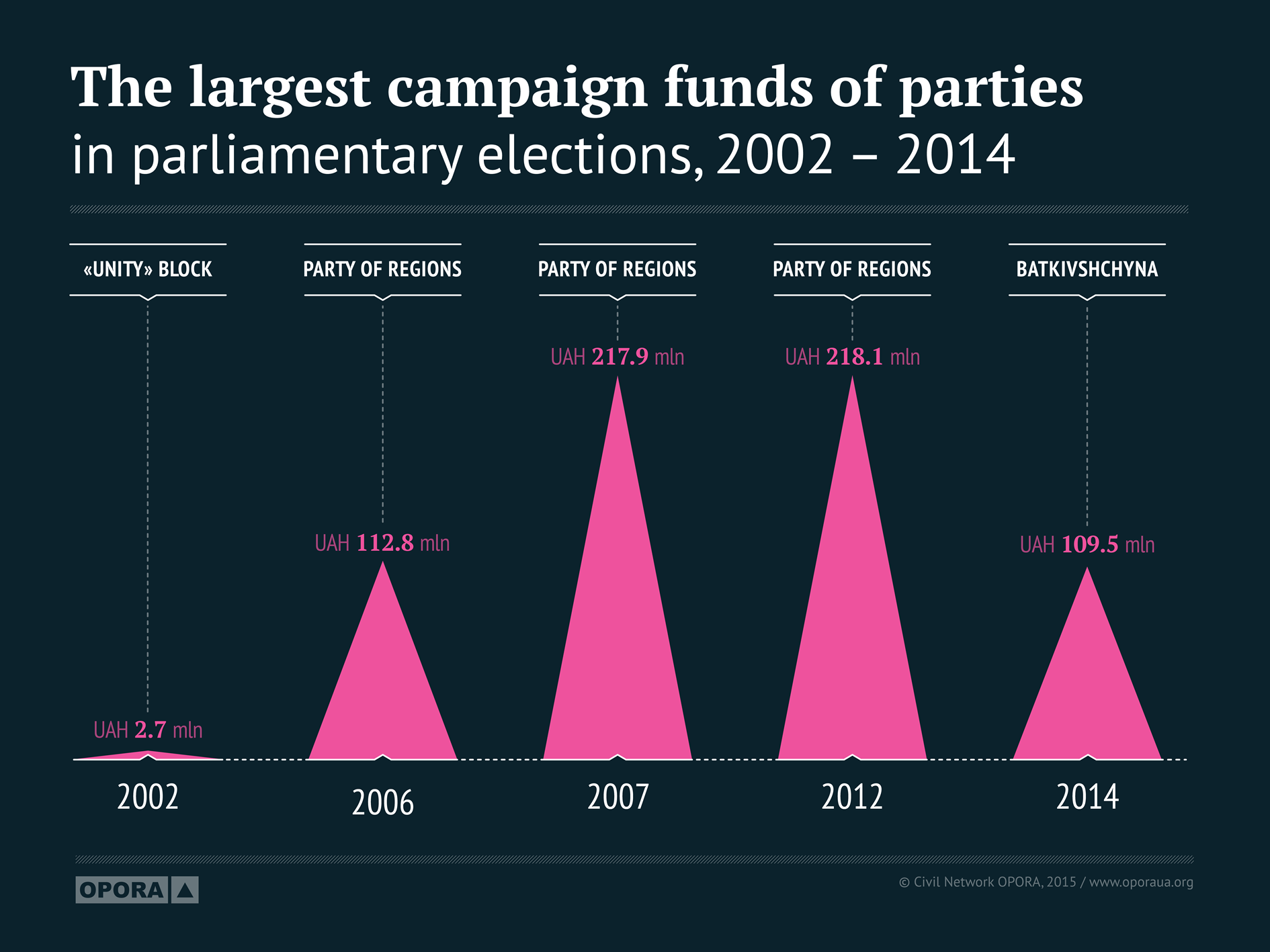
Officially reported amounts of donations usually don't show the real level of financial support the parties receive from citizens. If we don't count UAH 100 mln. declared by the Batkivshchyna party as individual donations, which constitute 98% of the total amount of campaign funds declared, there are only 4% of individual donations in campaign funds reported for the 2014 parliamentary campaign. This percentage is similar to those of the previous years (2007 – 4.28%; 2006 – 13.23%; 2012 – 5.1%) and shows us that so-called "own funds" of the parties remain the dominant resource for campaign funds. Only 2 of 12 the most popular parties (which have received more than 1.5% of votes) – ZASTUP and Right Sector have quite high, but still low if compared to the Batkivshchyna, percentage of individual donations made to campaign funds (36% and 35% respectively). As for the other 9 parties, percentage of individual donations made to their campaign funds doesn't exceed 13%.
At the same time, Petro Poroshenko Block, Svoboda and Kommunist Party of Ukraine haven't reported any individual donations in their campaign funds. In fact, most of such individual donations to electoral funds are made by party members themselves, as demanded by a party or on its own initiative. Campaign fund of the Batkivshchyna party is a bright example of such approach, where 98% of reported funds are donations from individuals.
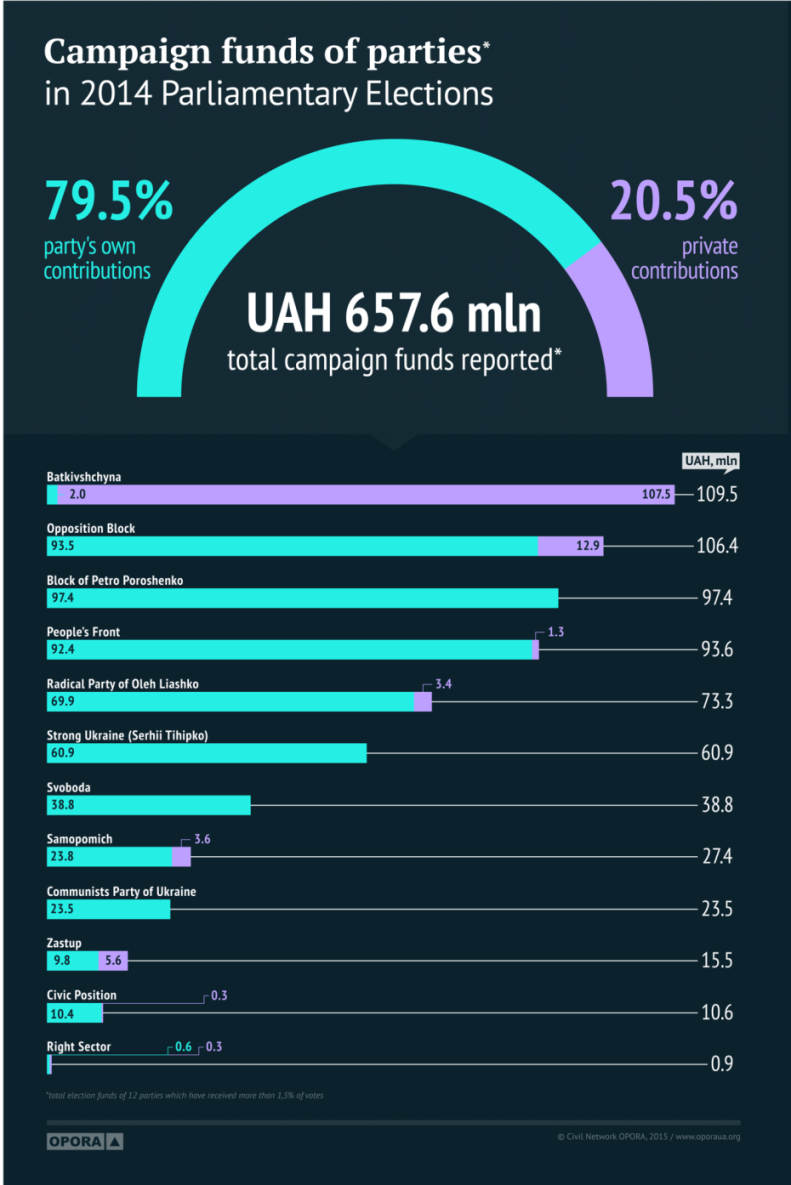
As for per voter cost for parties which have won parliamentary race in 2014, the AUU Batkivshchyna has spent the largest amount – 122 UAH on each person who supported it in the elections. The Samopomich has spent the least – 16 UAH per voter. To compare, the highest per voter cost in 2012 was paid by the Party of Regions – 36 UAH, and the lowest by the AUU Svoboda – 11 UAH. As for per voter cost for parties which didn't manage to get into the Parliament, the Strong Ukraine had spent the most – 124 UAH per vote in 2014, and the Our Ukraine spent 280 per voter in 2012. The calculation of per seat cost showed that the AUU Batkivshchyna has also paid the highest price per seat in the Parliament – UAH 6.7. The Samopomich, to compare, has spent UAH 0.9 mln per each seat in the Parliament.
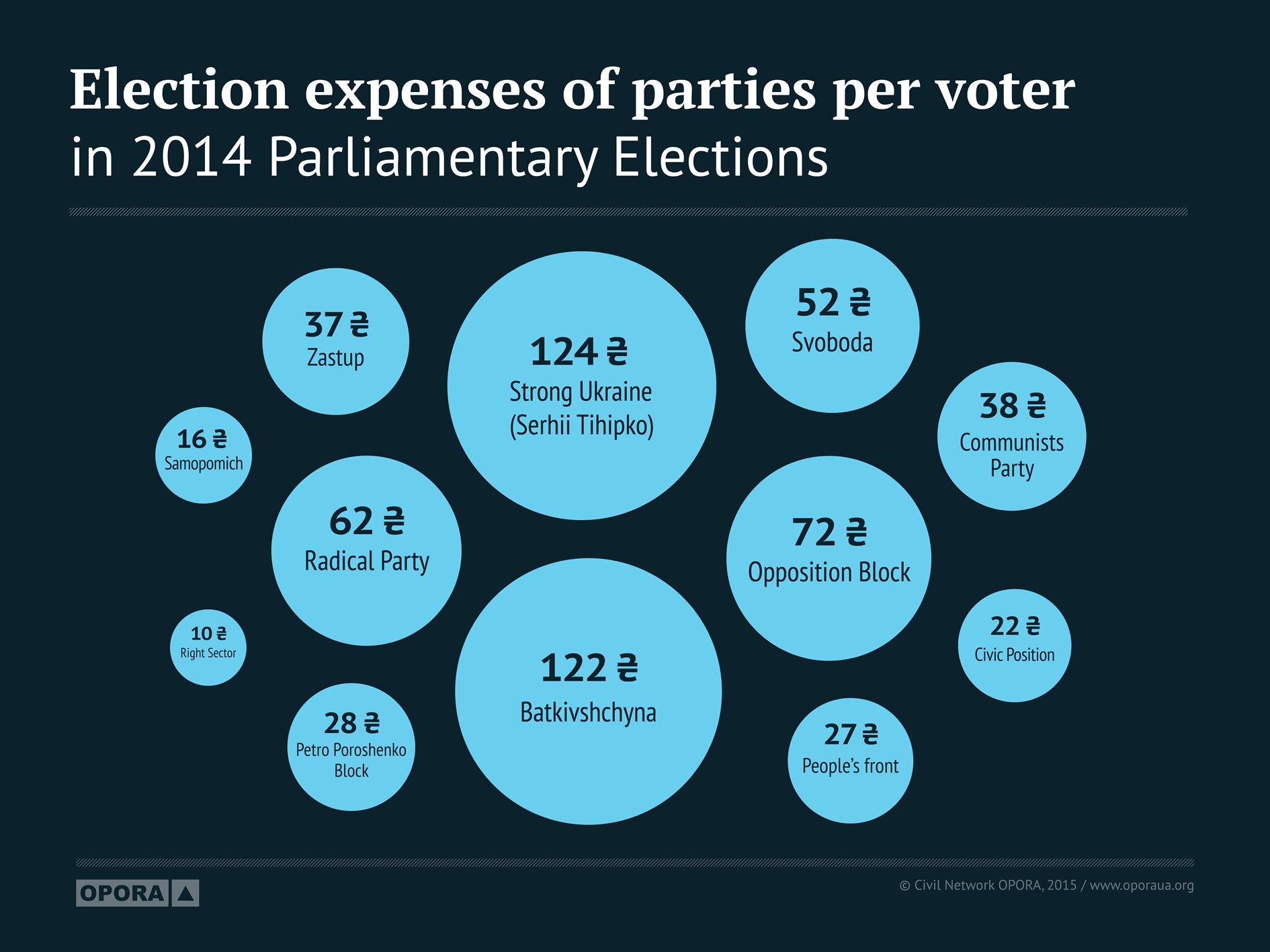
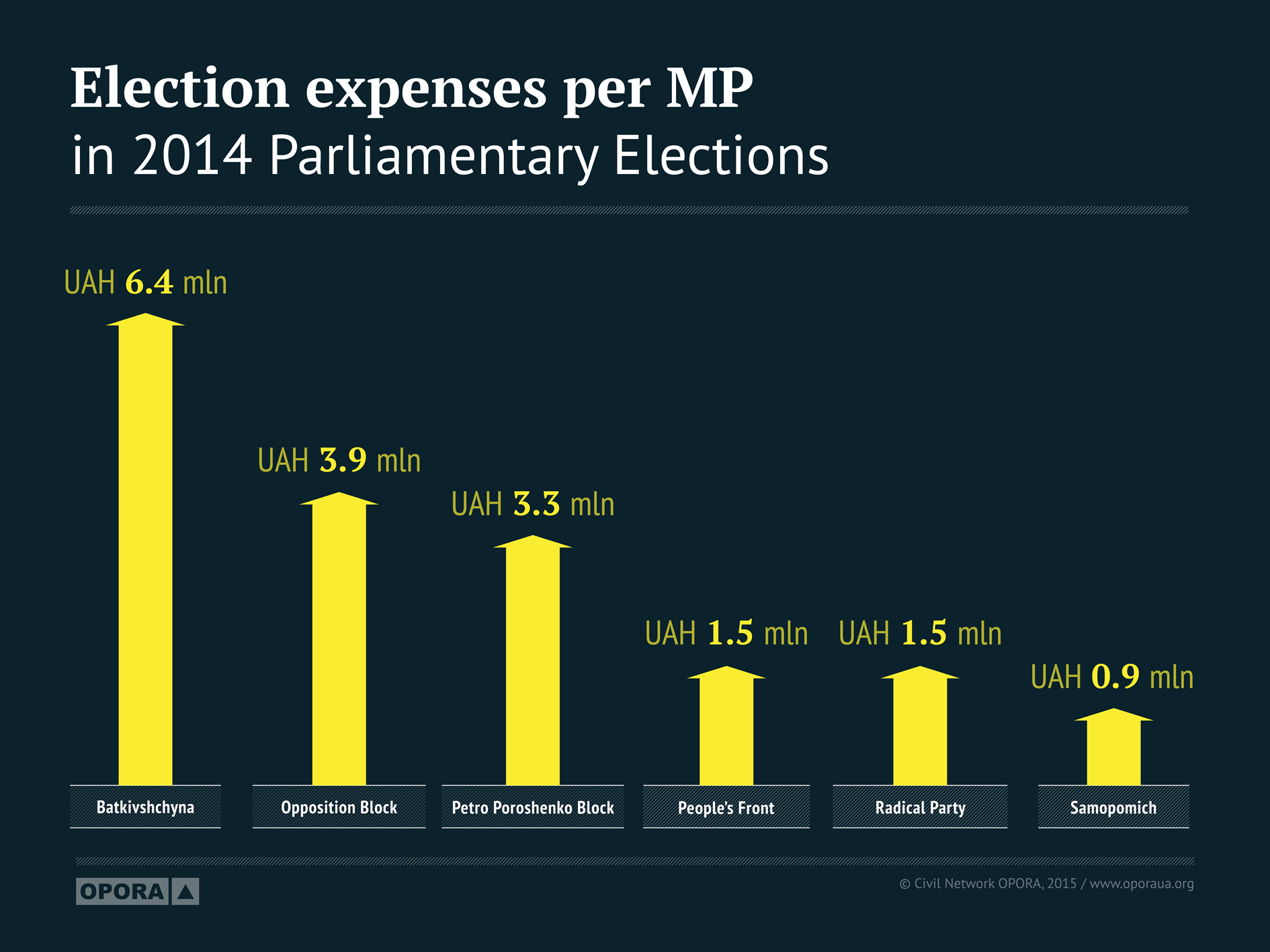
OPORA's analyst Oleksandr Neberykutunderlined that the expenses on the media (air time on TV and radio, materials in printed media) took over 90% of all funds the parties spent on campaigning. Opposition Block and AUU Batkivshchyna had the largest expenses – over UAH 100 mln and around UAH 99 mln respectively. Expenses on other types of campaigning (outdoor advertising, printed campaign materials) are exceedingly smaller. However, parties continue using finances not included in their campaign funds. For example, expenses on campaigning before they are officially registered as electoral subjects, non-monetary donations which are not included in financial reports, misuse of administrative resources. If strict limitations are introduced without any oversight mechanisms, shadow campaign financing will remain a topical issue.
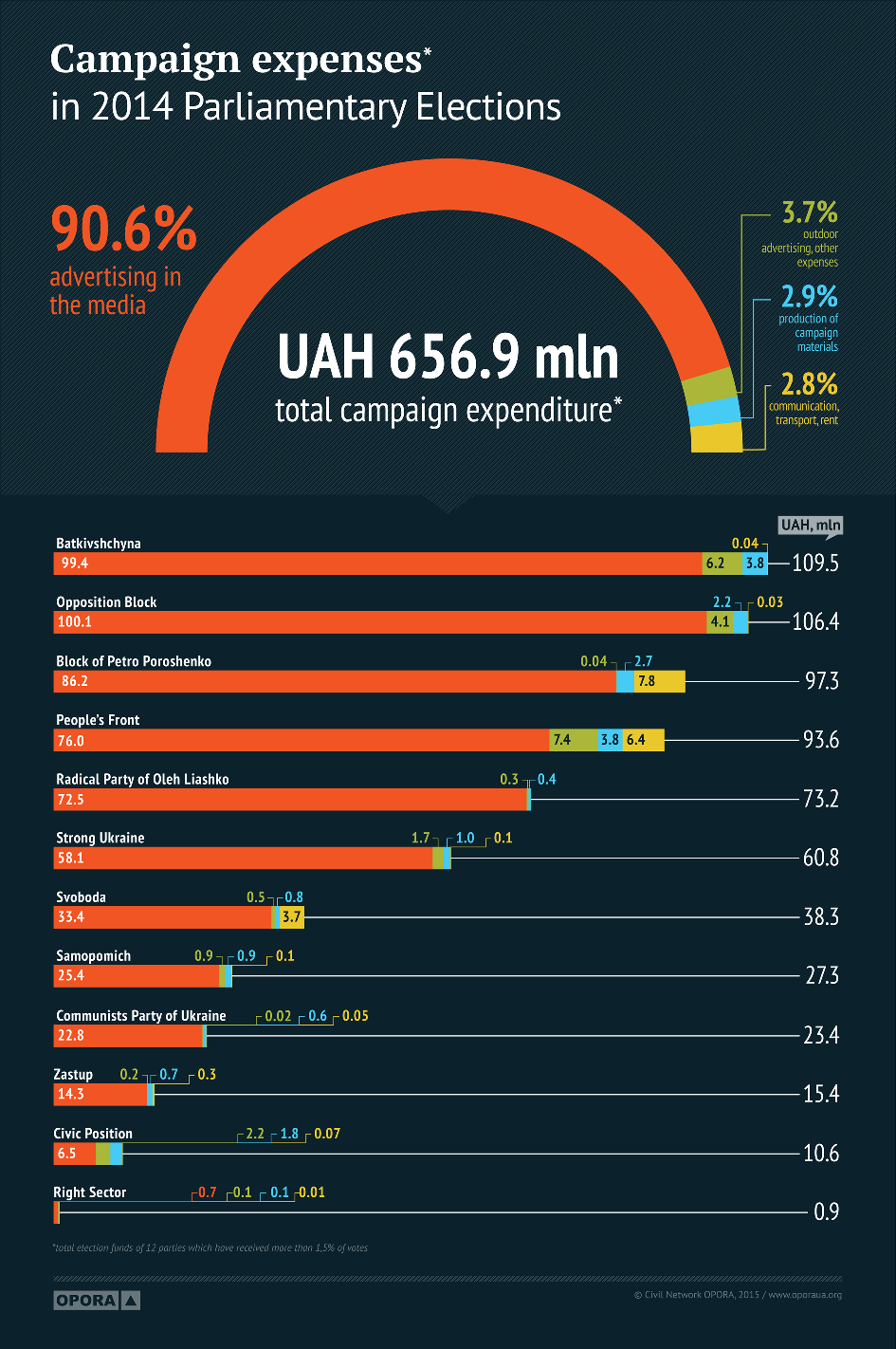
The Central Election Commission, which is authorized to secure the state oversight of campaign financing and analyze financial reports of political parties, doesn't have enough powers and resources to efficiently control campaign funds of parties and counteract election law violations. Analysis of financial reports is formalistic and doesn't show the real situation with campaign financing. There are still no precedents in Ukraine regarding sanctions against parties violating the procedures of party financing and campaign financing.
Recommendations of the Civil Network OPORA
- It's necessary to secure on the legislative level that parties and candidates shall not conduct any campaigning before the election process starts and electoral funds are created.
- Full reports on the receipt and use of election funds should be published on website of the CEC in a form easy to access and a format convenient for comparison.
- The parties should voluntarily publish information about their campaign funds as well as reports on their filling and use in a convenient format.
- Activities of election headquarters should be legalized and regulated by the legislation. Information about expenses on election headquarters should be transparent and included in financial reports on the receipt and use of election funds.
- Parties must be obliged to publish full financial reports before an election campaign. They should also publish all financial reports on their websites.
- Reports on the receipt and use of election funds must undergo an independent audit. Audit reports must be published together with financial reports.
- Oversight and monitoring of campaign financing should be conducted by an independent and specialized body having the authority to detect and prevent law violations. Anti-Corruption Bureau could implement such functions if it's authorized to investigate violations of party and campaign financing and apply sanctions.
For comment, please contact: Olha Aivazovska, 063 517 97 50
Parliamentary monitoring | Website | Facebook | Twitter (#rada8; #рада8; #opora; #опора)